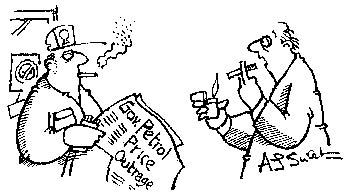The Fawn came up to me the other day in a state of extreme agitation: she’d been listening to George Monbiot on the radio.
The Fawn came up to me the other day in a state of extreme agitation: she’d been listening to George Monbiot on the radio. My ears pricked up. I do so love it when the Fawn gets cross about the same things as me. It makes me glad that I’m not married to one of those leftie wives — we all know the sort — who drag their more right-wing husbands down the siren path of bien-pensant foolishness.
Monbiot had been on the Today programme with Tiff Needell, the likeable racing driver who used to co-present Top Gear. They’d been discussing the decision by Spain’s socialist government to ‘lower energy costs’ by knocking 10kmh off the national speed limit. What had driven the Fawn to near-apoplexy was when Monbiot had put on his soft, reasonable, caring, Watch With Mother voice and said: ‘Just slowing down a little bit would do us all so much good.’
Having listened to Monbiot just now on BBC Radio 4’s Listen Again I entirely understand the Fawn’s fury. What’s so maddening is the ruthlessness and glib, practised ease with which he tickles the BBC’s prejudices. He can afford to be relaxed and expansive because he knows Sarah Montague isn’t going to challenge him. After all, why should she? Doesn’t every reasonable person in the world know that life in the fast lane is killing us, that slow food is the opposite of McDonald’s, that we all need to relax just a little bit more, that cars are evil, trains are good, and bicycles even better?
Actually the points Tiff Needell made were very good ones. If the Spanish government wants to save money by forcing all its ministerial limos to drive more slowly, fine — but why impose its obsession on free individuals? As for the economic arguments, these hardly stand up either. What about all those extra man-hours which would be frittered away through longer commuting times?
But Needell, increasingly, is a voice in the wilderness. All right, we have Top Gear too, but Top Gear is the exception that proves the rule. It’s like a Potemkin Village for petrolheads. ‘Look!’ it says. ‘We are still a free country really. See how our national broadcaster cheerfully participates in the celebration of motor vehicles driven by amusing (and cheekily unreconstructed) males at irresponsible speeds. So James Hunt and Jim Clark and Piers Courage aren’t turning in their graves, see. And you are not a number!’
We bloody are, though. And not just in this country, either. The other day I was driving through a small village in Germany, no one about, totally empty, when ‘BLAT!’ — I’d been got by a speed camera. Was I driving too fast for the conditions? Absolutely not. It’s what happens when you’re middle-aged and have kids: you drive round built-up areas like the considerate mimser you’ve become. Yet still the camera got me because car-hatred has reached such a pitch that greens and safety Nazis can now get away with passing laws where drivers can be punished for exceeding speed limits so slow you might just as well leave the car at home and go by zimmer frame instead.
Which, of course, is exactly the intention. It’s what David Cameron might call the ‘nudge’ effect. Or what you and I might call the ‘smash you in the face with a spiked sledgehammer’ effect. Driving a car is being deliberately made so vilely unpleasant in so many ways — from the fuel costs to the insurance to the traffic regulations — that only a masochist would want to carry on doing it.
And yet, of course we do. We do it because our cars represent the thing we value more than perhaps anything in the world: freedom. We can decide when we start our journey, what route we take, how fast we want to drive, where we stop for coffee breaks, what kind of music we play, who our fellow passengers are, even what the ambient temperature should be. There’s no other form of transport that offers this range of options. If there were, we would have abandoned the car long ago.
Given that all this is so — and it is — why then do we drivers allow so many inconveniences to be imposed on us by the state? Why, for example, has there not been a rebellion over the fact that the tax rate, including duty and VAT, on the average wholesale price of petrol is 189 per cent? Why don’t we show more spunk and resistance on those ludicrous quasi-Marxist re-education courses we can ‘choose’ to go on if we’re caught speeding? Why do we meekly accept for minor infractions fines so swingeing and vindictive you’d think we’d committed manslaughter?
The answer, I suppose, is cognitive dissonance. Despite everything we know from personal experience about the liberating wondrousness of our cars, we have yet been persuaded by activists like George Monbiot that our brains are deceiving us. Never mind the real-world evidence which shows, for example, that when the US abandoned its 55 mph speed limit, road accidents actually decreased — including in those states that had raised the speed limit. Never mind that today a car emits less pollution travelling at full speed than a parked car did in 1970 from leaks. Never mind that cars are growing cleaner, more fuel-efficient, safer than ever before. We refuse to accept this good news because we don’t want to accept this good news. The corollary, we have come to accept, of the convenience and comfort of driving is to lacerate ourselves with punitive guilt, higher taxes, greater restrictions.
George, you must feel so proud!







Comments